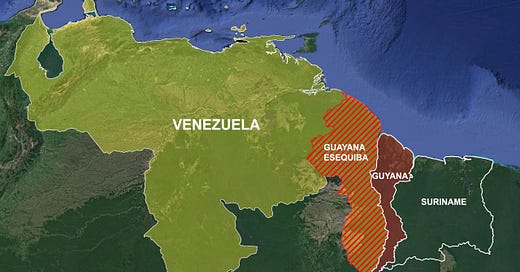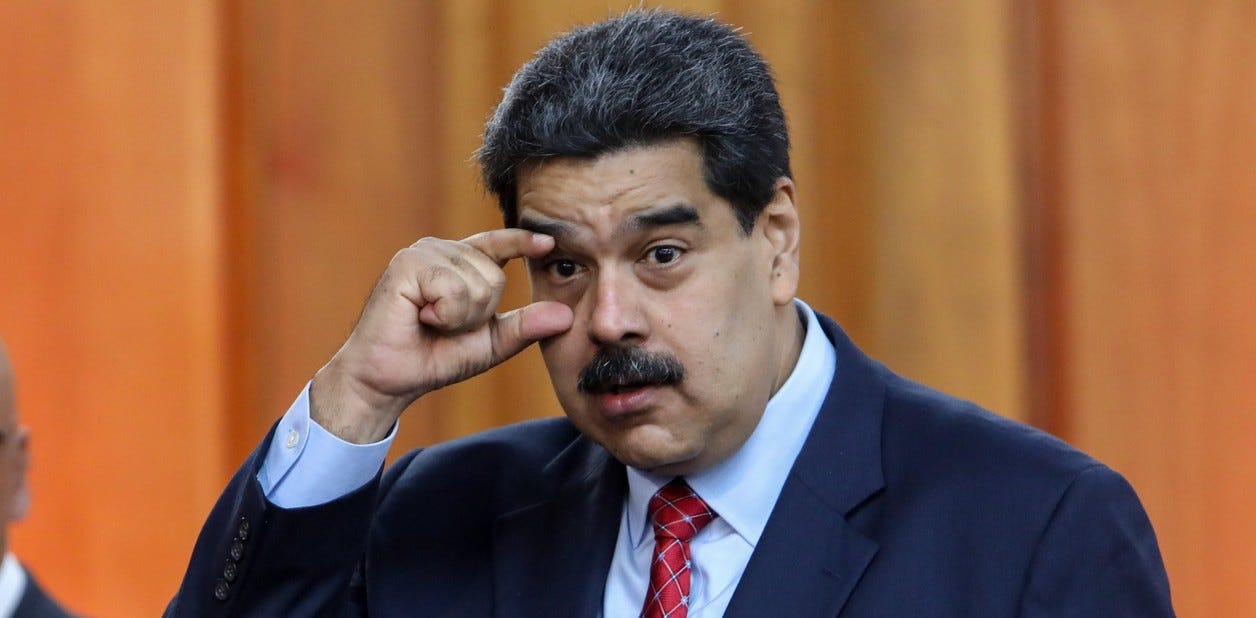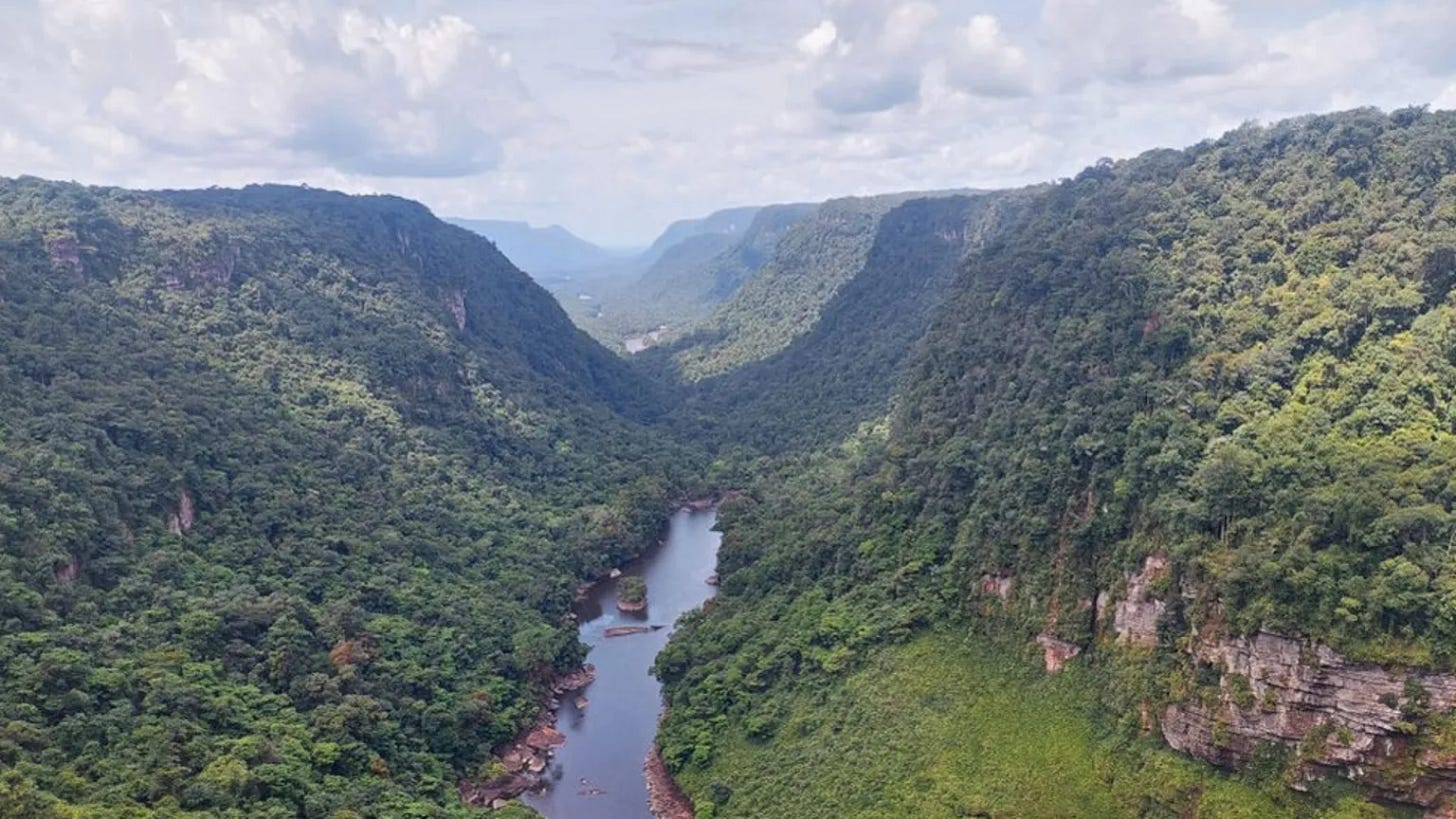News of a Venezuelan territorial claim on Guyana had undertones of an impending war when I first decided to write about it, but happily, the meeting in Saint Vincent between the heads of state of the conflicting countries has yielded a commitment to settle the dispute without using force. Mostly, that means Venezuela is standing down from its unreasonable position of two weeks ago. The historical background remains, and some of the analysis is still useful. Here is what I wrote a couple of days ago before the news to conduct peaceful negotiations.
The territorial dispute between Venezuela and Guyana over the Essequibo region isn’t new. The claim encompasses about 159,500 square kilometres, nearly two-thirds of Guyana. Venezuela's claim goes from its existing western border with Guyana deep into Guyanese territory to the Essequibo River. Guyana is the only English-speaking country on the South American mainland.
The dispute represents a complex intersection of history, manipulative politics, national pride, and economic aspirations. The dispute risks unleashing a chain reaction of conflict with important strategic implications for South America, the Caribbean region and the global oil market, including Alberta's oil sector. Given Venezuela's proximity to Russia and Iran, the conflict also risks dragging players outside the hemisphere into the conflict.
Historical Background to the Essequibo Territory
The Essequibo region's historical significance dates back to 17th-century colonial contests among the Spanish, Dutch, and British empires. The pivotal 1899 Arbitral Award, facilitated by Russia and the United States, assigned the majority of this territory to then-British Guyana. However, Venezuela disputes the legitimacy of this award, claiming the process was influenced by imperialistic agendas.
In what follows I'll drill a bit deeper into why this decision is disputed today, and what may be its implications.
In the context of the Essequibo conflict, the Arbitral Award specifically refers to the decision made by an international tribunal known as the Arbitral Tribunal of the Geneva Agreement in 1899. The Tribunal consisted of five members, with two appointed by Great Britain, two appointed by the United States, and a fifth member chosen by the four appointed arbitrators. The British-appointed members were Sir Richard Henn Collins, a British judge, and Sir Alfred Bateman, a British diplomat. The American-appointed members were David Josiah Brewer, an Associate Justice of the Supreme Court, and Andrew Dickson White, a former U.S. Ambassador to Germany and Russia.
The fifth member of the tribunal, known as the umpire, was Friedrich Martens, a Russian jurist and diplomat. Martens was chosen by the four appointed arbitrators to act as a neutral tiebreaker in case of any disagreements or deadlocks within the tribunal. His role was crucial in ensuring a fair and final decision on the border dispute. Together, these five individuals formed the 1899 Essequibo Arbitral Tribunal.
The Arbitral Award was issued on October 3, 1899. The tribunal carefully examined historical evidence, maps, and legal arguments presented by both sides. After a thorough analysis, the tribunal rendered its decision, which defined the boundary between Venezuela and Guyana in the disputed territory of Essequibo.
According to the arbitral award, the boundary line was drawn based on the principle of uti possidetis juris, which means that each country would retain possession of the territory it occupied at the time of the award. The tribunal considered factors such as historical occupation, effective control, and the rights of the local populations in determining the boundary line. As a result, the arbitral award granted the majority of the disputed territory to Guyana, while Venezuela retained a smaller portion.
Venezuela and Guyana initially accepted the arbitral award, which served as the basis for their border relations for several decades. However, in the 1960s, with Guayana's independence in 1966 and the age of “decolonization” in full gear, Venezuela began to question the validity of the 1899 decision, claiming that it was void due to alleged procedural irregularities and errors in the tribunal's decision. This led to renewed tensions and the resurfacing of the Essequibo conflict between the two countries. In the same year that Argentina unsuccessfully seized the Falkland Islands from Britain, in 1982, which unleashed the Falklands War, Venezuela officially claimed sovereignty over the Essequibo region.
Despite the ongoing dispute, the arbitral award remains a significant milestone in the history of the Venezuela-Guyana border dispute. It offers a legal framework for understanding the historical context and basis of the dispute. The Arbitral Award continues to be partially a subject of discussion and negotiation between Venezuela and Guyana, as they seek to find a mutually acceptable resolution to the Essequibo conflict.
Major international players have also gotten involved in this conflict. This includes the United Nations (UN) and the International Court of Justice (ICJ), who have made numerous attempts to mediate the disagreement. The UN considers it to be a matter of international peace and security. In 2020, the ICJ affirmed its jurisdiction over the controversy and directed both nations to submit their respective arguments on the matter. Making matters more complicated, Venezuela rejects the ICJ's ruling regarding jurisdiction.
A Snapshot of Essequibo’s Resource Potential
The territory in question is much more than a swath of disputed land in the jungle -- contained within its boundaries are vast amounts of oil and mineral resources. Since ExxonMobil discovered significant offshore oil deposits in Essequibo waters in 2015, the stakes have been raised. It's estimated that there's a bounty of over 13 billion barrels of oil, making it one of the largest offshore oil discoveries of the last decade. The economic potential of this disputed territory is remarkable, and so, understandably, the contestation over its ownership has only intensified.
Attempts at Resolution
Negotiations have often been fraught and unsuccessful, primarily due to the magnitude of the economic and strategic implications the territory carries. Nevertheless, both countries have engaged in multiple rounds of talks to find a peaceful resolution to this century-old territorial dispute. These attempts are failing, and a new verdict from the ICJ may be years away.
On Sunday, December 3, Venezuela held a poorly attended national referendum, against the advice of the ICJ. The Venezuelan government believes it has the authority now to annex Essequibo, and has begun to make moves to do so. Guyana has mobilized its forces and fears an invasion. The United States in conducting naval exercises with Guyana off the coast of the disputed territory. Brazil is alarmed and has started moving soldiers inside its borders toward the border with Venezuela. Venezuelan troops travelling to Essequibo by road would have to cross Brazilian territory given where the road infrastructure is located. Venezuela keeps rattling its sabre.
Guyana's Position
Guyana firmly upholds the 1899 Arbitral Award as legally binding and asserts sovereignty over the entire Essequibo region. Guyana's stance is not just a matter of territorial integrity but also of national development, given the region's rich natural resources, which include not only oil but also gold, diamonds, and timber.
The Controversy Over the Arbitral Award
In the eyes of Venezuela, the 1899 Arbitral Award was a flawed process. They claim it was not an award decided impartially but was heavily influenced by the political interests and imperialistic ambitions of the major powers at that time.
Why Venezuela officially disputes the decision.
Insufficient Representation: First, Venezuela argues that it did not have adequate representation during the tribunal sessions. It asserts that the arbitrators were almost entirely from the rival nations, thus compromising the neutrality of the proceedings.
1. Hidden Agendas: Second, Venezuela claims that there were hidden agendas at play. It believes that the award was influenced by the geopolitical interests of the time.
2. Violation of Sovereignty: Third, Venezuela asserts that the decision was a violation of its sovereignty. They maintain that by accepting a non-consensual arbitration, their rightful claim to the Essequibo territory was unfairly undermined.
These reasons, among others, have persistently underlined Venezuela's insistence on questioning the validity of the 1899 Arbitral Award and, subsequently, Guyana's possession of the Essequibo territory.
Venezuela's Grievance and Motivations Venezuela's claim over the Essequibo region is rooted in a historical narrative that views the 1899 decision as an imperialist imposition. The discovery of substantial oil reserves, estimated to be around 13.6 billion barrels, and other valuable minerals in the region has reignited Venezuela's claim.
Venezuela's renewed interest in the Essequibo can be attributed to economic pressures, exacerbated by its current socio-political crisis, and a heightened sense of nationalism. It seems the classic move of a weak regime to find an outside threat to distract the minds of its citizens from the poverty and chaos that the Chavista regime has caused.
Historically, Venezuela has communicated its discontent about the 1899 decision - put into effect by an international tribunal in Paris - to assign the disputed territory to Guyana, then a British colony. They claim that the ruling was shaped by a conspiracy against them by powerful nations, subduing Venezuela's interests. Ever since, this perceived indignity has been a cornerstone of Venezuela's nationalistic rhetoric.
But don’t forget how the issue regained prominence when vast oil reserves were detected in this disputed Essequibo region. Venezuela can't overlook the potential economic boost this could provide, especially as their own reserves dwindle due to mismanagement. Factor in the collapse of the Venezuelan economy and the nation's dependency on oil, you can see why control over the Essequibo and its richness is crucial for them. The projected wealth flourishing beneath the surface of the Essequibo region has undoubtedly stirred the waters of conflict.
Conversely, Guyana, though less economically dependent on oil, sees potential in this newfound wealth. The revenues generated from these reserves represent a golden opportunity for development and social and economic progress. Their claims aren't solely based on avarice or expansion but view this as a chance to bring prosperity to their country. You may be wondering why this is vital. Well, Guyana is one of the poorest countries in the Western Hemisphere. The potential transformation cannot simply be overlooked.
Implications for Neighbors and Caribbean Security The dispute extends beyond Venezuela and Guyana, posing potential security risks for the southern Caribbean region. The involvement of external actors, such as the United States, Iran, Russia and China, in backing different sides could lead to increased geopolitical tensions.
Moreover, the presence of vast resources in the disputed area makes it a flashpoint for regional stability. Strong economic and strategic factors are driving nations to take interest in the Essequibo region. It's not just about territorial claims.
The Role of Oil
The ExxonMobil discovery in 2015 shows a high-quality oil reservoir in the disputed waters. It's a gold rush, except instead of mining for gold, it's drilling for oil. Venezuela, facing self-inflicted economic hardships, sees these oil resources as critical for its recovery.
Venezuela is the holder of the second- or third-largest reserves of oil in the world. Notwithstanding its vast reserves, its socialist government has wildly mismanaged production and dilapidated its wealth in the last two decades. Acquiring 20 per cent more oil is not a bad thing for anyone, but it is not what Venezuela needs to overcome the economic crisis its policies have created. It is not a solution to Venezuela’s dire problems. The Maduro regime is perfectly capable of mismanaging 20 per cent more oil.
Stakeholders and Interests
Now picture Venezuela and Guyana as the main players on the chessboard. Their dispute over the Essequibo is not just about the control of a territory. It's a far more complex situation involving varied stakeholders with different interests. Let's break it down:
Venezuela: Facing mounting economic problems, Venezuela sees the resource-rich Essequibo region as a potential solution to its issues.
Guyana: A small nation looking to secure its borders and interests. Given its recent discoveries of oil deposits, Guyana aims to solidify its claim over the region and utilize its resources to boost its economy.
Regional and Global Powers: Neighbors such as Brazil and Colombia aren’t interested in a major war revisiting the region. Brazil is very involved in bringing the parties to talk and trying to prevent the potential use of its territory in the conflict. The United States, Russia, and China, among others, have their eyes set on the region due to its resource potential. They're looking to establish ties with the nation that ultimately controls Essequibo.
The Game Moves: Negotiations and Disputes
Just like in chess, the Essequibo conflict has seen a series of moves and counter-moves. Each party attempts to negotiate, claiming the territory as its own while managing regional and international reactions. Diplomatic negotiations, international court proceedings, displays of military strength—each move on the chessboard adds a new layer of complexity to the conflict
As if the elements of oil and territorial disputes weren't complicated enough, geopolitical chess is being played in the background. From a geopolitical perspective, the involvement of powers like Russia and China adds a whole new dimension to the conflict. Consider how the backing of these nations might have implications for the power balance in the region.
Economic ramifications
The Essequibo region is believed to be a gold mine, quite literally, in terms of natural resources. For Venezuela, a country grappling with economic woes, this territory promises a great deal of economic rejuvenation. On the other hand, Guyana fears the loss of apparent revenues that this region's resources could pull through.
Political consequences
The political aftermath of the conflict could lead to a rearranged regional map, with foreign global players from outside the hemisphere enhancing their positions in the region. There have been shifts in alliances, with the involvement of foreign powers like the United States, Russia, China and Iran.
This conflict has intensified posturing and power games on the international stage, shadowing negotiations and conversational engagements between the countries. It may have an impact on conflicts already underway in Europe and the Middle East and may inspire more territorial conflict in the Far East.
Implications for Oil and Alberta Oil The Essequibo's oil reserves, part of the Guyana-Suriname basin, have global market implications. For Alberta's oil industry, this emerging supply source presents both a competitive challenge and potential investment opportunities. The Guyanese oil boom could affect global oil prices and market dynamics, impacting Alberta's oil exports.
Competition and Opportunities for Alberta's Oil Industry
The injection of Guyanese crude into the global market could exert downward pressure on oil prices and squeeze profit margins for other producers. Just as Alberta's oil industry gets to grips with this new reality, opportunity also knocks. As investments pour into the Guyanese oil economy, Albertan oil companies with the right skills and experience could share in the prosperity.
In closing, the Essequibo dispute has a multidimensional area with historical, legal, economic, and geopolitical layers. Its resolution is critical not only for Venezuela and the future of the Chavista Revolution there but also for Guyana, for maintaining stability in the Caribbean and for the broader implications it holds for global energy markets and other territorial disputes elsewhere.
Post Script: The latest reports say that the heads of state of Guyana and Venezuela will meet this weekend to discuss options.






